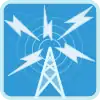Portal:Telecommunication
The Telecommunication Portal

Telecommunication is the transmission of information by various types of technologies over wire, radio, optical, or other electromagnetic systems. It has its origin in the desire of humans for communication over a distance greater than that feasible with the human voice, but with a similar scale of expediency; thus, slow systems (such as postal mail) are excluded from the field.
The transmission media in telecommunication have evolved through numerous stages of technology, from beacons and other visual signals (such as smoke signals, semaphore telegraphs, signal flags, and optical heliographs), to electrical cable and electromagnetic radiation, including light. Such transmission paths are often divided into communication channels, which afford the advantages of multiplexing multiple concurrent communication sessions. Telecommunication is often used in its plural form.
Other examples of pre-modern long-distance communication included audio messages, such as coded drumbeats, lung-blown horns, and loud whistles. 20th- and 21st-century technologies for long-distance communication usually involve electrical and electromagnetic technologies, such as telegraph, telephone, television and teleprinter, networks, radio, microwave transmission, optical fiber, and communications satellites.
A revolution in wireless communication began in the first decade of the 20th century with the pioneering developments in radio communications by Guglielmo Marconi, who won the Nobel Prize in Physics in 1909, and other notable pioneering inventors and developers in the field of electrical and electronic telecommunications. These included Charles Wheatstone and Samuel Morse (inventors of the telegraph), Antonio Meucci and Alexander Graham Bell (some of the inventors and developers of the telephone, see Invention of the telephone), Edwin Armstrong and Lee de Forest (inventors of radio), as well as Vladimir K. Zworykin, John Logie Baird and Philo Farnsworth (some of the inventors of television).
The early telecommunication networks were created with copper wires as the physical medium for signal transmission. For many years, these networks were used for basic phone services, namely voice and telegrams. Since the mid-1990s, as the internet has grown in popularity, voice has been gradually supplanted by data. This soon demonstrated the limitations of copper in data transmission, prompting the development of optics. (Full article...)
Selected article -

The International Telecommunication Union (French: Union Internationale des Télécommunications) is a specialized agency of the United Nations responsible for many matters related to information and communication technologies. It was established on 17 May 1865 as the International Telegraph Union, making it the first international organization. Doreen Bogdan-Martin is the Secretary-General of ITU, the first woman to serve as its head.
The ITU was initially aimed at helping connect telegraphic networks between countries, with its mandate consistently broadening with the advent of new communications technologies; it adopted its current name in 1932 to reflect its expanded responsibilities over radio and the telephone. On 15 November 1947, the ITU entered into an agreement with the newly created United Nations to become a specialized agency within the UN system, which formally entered into force on 1 January 1949. (Full article...)General images
Things to do
 |
Here are some tasks awaiting attention:
|
Selected biography -
 Nipkow in about 1884 |
Paul Julius Gottlieb Nipkow (22 August 1860 – 24 August 1940) was a German technician and inventor. He invented the Nipkow disk, which laid the foundation of television, since his disk was a fundamental component in the first televisions. Hundreds of stations experimented with television broadcasting using his disk in the 1920s and 1930s, until it was superseded by all-electronic systems in the 1940s.
Nipkow has been called the "father of television", together with other early figures of television history like Karl Ferdinand Braun. (Full article...)Did you know (auto-generated) -
- ... that Terence Lam, who initially did not plan to become a singer, received ViuTV Chill Club's best male singer award and Commercial Radio Hong Kong's best new artist award?
- ... that Colorado public television station KTSC operates from two studios named for the same benefactor?
- ... that the Argentine government took over operations of television channel 8 at Mar del Plata in 1973, only to privatize it again a decade later?
- ... that an Ohio radio station's satellite dish was vandalized twice in 1991, believed by the station manager to be due to the outspoken conservative stances of one of the station's hosts?
- ... that the weekly radio show The Northern Messenger read out personal messages from around the world to friends and family in the Arctic who could not be reached in any other way during the winter?
- ... that coverage of the 1952 funeral of George VI may have led to the mass purchase of television sets in the United Kingdom?
Related portals
Topics
Subcategories
Associated Wikimedia
The following Wikimedia Foundation sister projects provide more on this subject:
-
 Commons
Commons
Free media repository -
 Wikibooks
Wikibooks
Free textbooks and manuals -
 Wikidata
Wikidata
Free knowledge base -
 Wikinews
Wikinews
Free-content news -
 Wikiquote
Wikiquote
Collection of quotations -
 Wikisource
Wikisource
Free-content library -
 Wikiversity
Wikiversity
Free learning tools -
 Wiktionary
Wiktionary
Dictionary and thesaurus
-
 List of all portalsList of all portals
List of all portalsList of all portals -
 The arts portal
The arts portal -
 Biography portal
Biography portal -
 Current events portal
Current events portal -
 Geography portal
Geography portal -
 History portal
History portal -
 Mathematics portal
Mathematics portal -
 Science portal
Science portal -
 Society portal
Society portal -
 Technology portal
Technology portal -
 Random portalRandom portal
Random portalRandom portal -
 WikiProject PortalsWikiProject Portals
WikiProject PortalsWikiProject Portals
























_LCCN2014717186.jpg.webp)




























.svg.png.webp)



.jpg.webp)



.jpg.webp)




